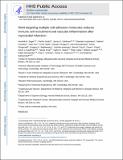RNAi targeting multiple cell adhesion molecules reduces immune cell recruitment and vascular inflammation after myocardial infarction
Author(s)
Sager, H. B.; Dutta, P.; Hulsmans, M.; Courties, G.; Sun, Y.; Heidt, T.; Vinegoni, C.; Borodovsky, A.; Fitzgerald, K.; Wojtkiewicz, G. R.; Iwamoto, Y.; Tricot, B.; Libby, P.; Weissleder, R.; Swirski, F. K.; Nahrendorf, M.; Xing, Yiping; Shaw, Taylor E.; Langer, Robert S; Anderson, Daniel Griffith; Khan, Omar Fizal; Kauffman, Kevin John; Dahlman, James E.; ... Show more Show less
DownloadAnderson_RNAi targeting.pdf (3.028Mb)
OPEN_ACCESS_POLICY
Open Access Policy
Creative Commons Attribution-Noncommercial-Share Alike
Terms of use
Metadata
Show full item recordAbstract
Myocardial infarction (MI) leads to a systemic surge of vascular inflammation in mice and humans, resulting in secondary ischemic complications and high mortality. We show that, in ApoE−/− mice with coronary ligation, increased sympathetic tone up-regulates not only hematopoietic leukocyte production but also plaque endothelial expression of adhesion molecules. To counteract the resulting arterial leukocyte recruitment, we developed nanoparticle-based RNA interference (RNAi) that effectively silences five key adhesion molecules. Simultaneously encapsulating small interfering RNA (siRNA)–targeting intercellular cell adhesion molecules 1 and 2 (Icam1 and Icam2), vascular cell adhesion molecule 1 (Vcam1), and E- and P-selectins (Sele and Selp) into polymeric endothelial-avid nanoparticles reduced post-MI neutrophil and monocyte recruitment into atherosclerotic lesions and decreased matrix-degrading plaque protease activity. Five-gene combination RNAi also curtailed leukocyte recruitment to ischemic myocardium. Therefore, targeted multigene silencing may prevent complications after acute MI.
Date issued
2016-06Department
Massachusetts Institute of Technology. Institute for Medical Engineering & Science; Harvard University--MIT Division of Health Sciences and Technology; Massachusetts Institute of Technology. Department of Chemical Engineering; Koch Institute for Integrative Cancer Research at MITJournal
Science Translational Medicine
Publisher
American Association for the Advancement of Science (AAAS)
Citation
Sager, H. B. et al. “RNAi Targeting Multiple Cell Adhesion Molecules Reduces Immune Cell Recruitment and Vascular Inflammation after Myocardial Infarction.” Science Translational Medicine 8.342 (2016): 342ra80-342ra80.
Version: Author's final manuscript
ISSN
1946-6234
1946-6242